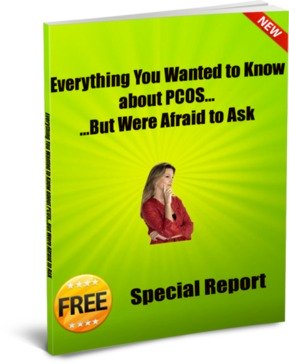PCOS Review Newsletter #131
1) Fruit Juice & Fructose Sweeteners Can Cause You Big Trouble
2) Magnesium Is Magnificent for PCOS
3) Signs of PCOS in Young Girls
1) Fruit Juice & Fructose Sweeteners Can Cause You Big Trouble
This is an important nutritional tip that could make a real difference in your progress towards control over polycystic ovarian syndrome.
Dr. Richard Johnson at the University of Colorado and author of "The Sugar Fix" has been reporting some interesting possible connections between fructose sweeteners and the symptoms you're experiencing.
Fructose, known as fruit sugar, is found naturally in fruits and some other plant material. However, most of the fructose we consume is manufactured from plant material such as corn and is added to processed foods and beverages.
So what could possibly be wrong with a sweetener that is extracted from natural plant material?
Fructose has been associated with increasing rates of obesity, diabetes, high blood pressure, kidney disease, belly fat accumulation, insulin resistance, fatty liver disease, elevated blood fats, metabolic syndrome, and reduced appetite regulation. All of these are challenges that many PCOS women face. Therefore, consumption of fructose sweeteners is a risk factor for you.
There is some evidence to suggest that not everyone responds exactly the same to fructose. There may be some genetic factors involved.
In addition, it appears that some people with insulin resistance may be producing additional fructose from other dietary sugars and starches, via a metabolic pathway called "the polyol pathway". This could be relevant to you because a very high percentage of women with PCOS have some degree of insulin resistance. The worse your insulin resistance is, the more fructose your body is likely to create.
If you are one of these unfortunate people, you will not only need to avoid fructose sweeteners, you will also need to also avoid consumption of other simple sugars (such as table sugar), and reduce the amount of fruit in your diet. You would also want to completely eliminate fruit juice and all drinks containing fructose.
So how might you find out if you have a higher than average risk of damage from fructose?
One way is to ask your doctor for a "uric acid" test, which is a common component of a basic blood test. Fructose stimulates production of uric acid. Uric acid is a substance that is good when it is normal, but damaging when you have too much of it. So if your uric acid is found to be high, that could be a warning sign that you're consuming too much fructose and you need to avoid it.
The Natural Diet Solution for PCOS diet plan does not include ANY fructose sweeteners or table sugar. This type of diet gives you an excellent method of avoiding all of the health risks associated with fructose sweeteners, even if you have a genetic predisposition to have a problem with fructose.
Source:
Johnson, RJ et al, Hypothesis: Could Excessive Fructose Intake and Uric Acid Cause Type 2 Diabetes?, Endocr Rev. 2009 February; 30(1): 96116
2) Magnesium Is Magnificent for PCOS
The mineral magnesium is super-important to you and can help you in many ways. For example, it is valuable for reducing blood pressure, heart disease, and diabetes risk. It is necessary for your bone health, muscle and nerve function, and energy production. It improves your sleep quality and suppresses inflammation.
Magnesium also reduces insulin resistance, which is a primary cause of symptoms of polycystic ovary syndrome.
According to a study from the SUNY Health Science Center in New York, women with PCOS had a lower ratio of magnesium to calcium as compared to normal women. This suggests that women who have polycystic ovary syndrome may benefit by consuming more magnesium into order to achieve a better balance between magnesium and calcium. Magnesium and calcium are complementary minerals, so you need to have some of each and not too much of one or the other.
Even if your blood levels of magnesium are normal, you still may benefit by taking supplemental magnesium, according to the Institute of Sport Sciences in Germany. The people in this study had normal magnesium levels, were overweight and insulin resistant, but did not have diabetes. One group took a magnesium supplement for six months while the other group took a placebo.
In contrast to the placebo group, the group taking magnesium lowered their blood sugar levels and had some improvement in their insulin sensitivity. The researchers said that magnesium supplementation would be valuable for preventing insulin resistance and lowering the risk of diabetes.
You can increase magnesium by consuming more green vegetables, nuts and seeds.
You can also take a multi-vitamin/mineral that contains a balanced ratio of magnesium to calcium.
Sourcs:
Muneyyirci-Delale O et al, Divalent cations in women with PCOS: implications for cardiovascular disease, Gynecol Endocrinol. 2001 Jun;15(3):198-201
Mooren FC et al, Oral magnesium supplementation reduces insulin resistance in non-diabetic subjects - a double-blind, placebo-controlled, randomized trial, Diabetes Obes Metab. 2011 Mar;13(3):281-4
3) Signs of PCOS in Young Girls
New York University School of Medicine recently analyzed a group of 58 girls who had been diagnosed with PCOS. They divided them into two age groups: younger than 13 years old (preadolescents), and 13-18 years old (adolescents). One of every four girls was in the younger group.
The researchers discovered that the preadolescents had an earlier onset of pubic hair growth and breast development as compared to the adolescent girls. In addition, PCOS developed 2 years earlier in the preadolescent group than in the older girls.
The preadolescent group was also taller for their age than other girls.
So what does this mean?
It means that if you have a daughter younger than 13 who has budding breasts and public hair earlier than you think is appropriate, and if she is on the tall side, she might have PCOS or be on the path towards this disorder.
We tend to think that polycystic ovary syndrome is something that only young adult women have. However, this and other studies are showing that it can start at a very early age, even before puberty.
Source:
Bronstein J et al, Age of onset of polycystic ovarian syndrome in girls may be earlier than previously thought, J Pediatr Adolesc Gynecol. 2011 Feb;24(1):15-20
"As soon as you trust yourself, you will know how to live." -- Johann Wolfgang von Goethe
PCOS Health Review
This free newsletter gives you original and immediately usable information to help you deal with PCOS.
Get the latest research, tips for improving your health, answers to questions, success stories, and more!
Your e-mail address is totally secure. We will never misuse your information.
Enter Your Email Above to Subscribe Today
and Get Your Questions Answered in this Free Special Report!





